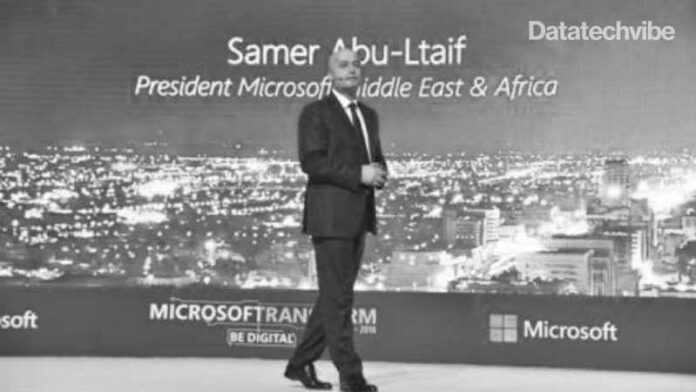Samer Abu-Ltaif’s observation comes after visiting Saudi Arabia last week, where he lauded the Saudi government’s ambitious vision and initiatives.
Samer Abu-Ltaif, Microsoft’s Corporate VP & President of the Middle East and Africa (MEA) region, praised Saudi Arabia’s great transition on the “digital economy” map, which has become one of the highlights of its future economic development and diversification.
Abu-Ltaif’s observation comes after he visited Saudi Arabia last week, where he lauded the Saudi government’s ambitious vision and initiatives, as well as maintaining a privileged position to advance the course of digitisation of its national economy, especially since the value of the digital economy will exceed $100 trillion globally by 2025. He commended Microsoft’s ability to enable the public and private sectors to achieve these transformations, with its innovations and expertise to help it achieve technological, economic sustainability.
Microsoft’s MEA Corporate VP & President noted a great tendency of the public and private sectors in Saudi Arabia to take advantage of the enormous technological opportunities and transition to the era of cloud and innovation. He also declared that Microsoft would contribute directly and indirectly to establishing the Kingdom’s strong and evolving digital structure, ramp up its digital transformation process, and support its ambitious vision of building a digital society, digital government, and a thriving digital economy.
Also Read: When Hackers Drive Your Car
Praising the response of the Saudi digital transformation system in dealing with the emerging COVID-19 pandemic in the sectors of work, health, education, trade, and finance, Abu-Ltaif explained that Microsoft contributed to overcoming the disruption during the pandemic through digital and cloud solutions in public and private sectors in the Kingdom, specifically in the field of distance education through its strategic partnership with the Ministry of Education.
Moreover, Abu-Ltaif emphasised Microsoft’s full support to the Green Saudi Arabia Initiative launched by Crown Prince Mohammed bin Salman, in March, by contributing to resist the challenges of climate change; demonstrating Microsoft’s technological ability to achieve the initiative’s chief goal and reach the “zero-carbon” level, which coincides with the Microsoft’s aims to become carbon negative by 2030. Microsoft aims to ultimately eliminate the carbon footprint by 2050 to achieve the planet’s environmental sustainability.
Abu-Ltaif further expressed that his visit will grow and elevate the prominent and long-standing relationship between Microsoft Arabia and its clients and partners in Saudi Arabia in the future, with a commitment to increase Microsoft’s impact to empower them in various fields and businesses.









